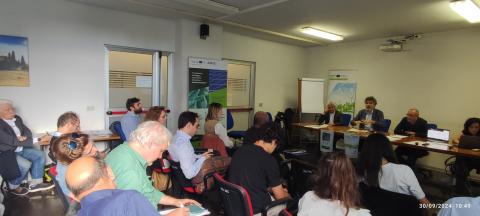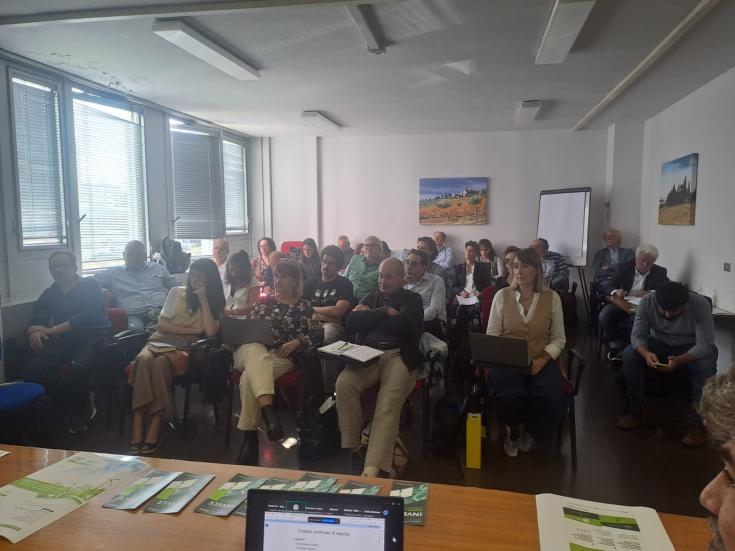Synergies between EU projects: 𝐑𝐄𝐂𝟒𝐄𝐔-𝐈𝐍𝐕𝐄𝐂𝐄 (1)
REGIONAL ENERGY STAKEHOLDER MEETING REC4EU (N. 4) / INVECE (n. 2)
Florence, September 30th 2024 – h. 10:00 – 13:30
On September the 30th 2024, the six-monthly meeting of the European projects #REC4EU and #INVECE between the local stakeholders (associations, bodies, universities etc.) that potentially may be interested in the development of RECs, was held at the headquarters of the Tuscany Region in Novoli, Florence. The event, organized by the Tuscany Region and ARRR, was attended by more than 35 subjects (both in presence and connected remotely) who were invited to give their contribution to improving local governance in the field of REC and to share critical issues or strengths faced during the constitution and development process.
Simone Tartaro (ARRR), moderator of the meeting, underlines the importance of having so many people around this table, demonstrating that interest in RECs is constantly growing and that EU projects provide the opportunity to exchange initiatives, good practices, information, results, etc. and to jointly address the problems that emerged in the establishment and development of RECs.
David Tei (Regione Toscana) is very satisfied for the participation of various categories of stakeholders (Universities with young researchers and doctoral students) interested and involved in what is being outlined in the field of RECs in Tuscany. He highlights how the problem of climate change, with often more alarming data, is not only increasingly current but above all it forces public decision makers to act very quickly in order to try and change the way we produce energy. He states that Tuscany wants to be present in the energy transition process. In Tuscany, RES are growing and in 2024 we faced a boom in requests for authorizations; but the 2030 objective (based on burden sharing at European and national level) is challenging because 4 GW of power must be added to the power of the RES plants by 2020 (around 2.5 GW).
It is necessary to ensure that there are no speculative operations behind the various initiatives. It is therefore important to encourage the growth of RES but equally essential is a good governance.
RECs are a tool through which Tuscany can achieve its 2030 objectives, even with small and medium-sized plants that share the produced energy.
Another positive aspect of RECs is that they represent a model focused on community, solidarity and the fight against energy poverty. By the end of the year, the Region's ERDF call for 20 million euros will be released to finance the RECs, in particular those that will have statutes and members based on solidarity. The objective is to start from the word “community” and to build the idea of producing energy to be shared around this.
Another element to pay attention to is law 101/2024 converting the Agriculture Legislative Decree which places an absolute ban on installing ground-mounted PV systems in agricultural areas with the exception of systems that are part of a REC: the danger to be avoided is the possible (and not desirable) constitution of RECs for the sole purpose of circumventing the law.
By the end of 2024, Tuscany Region will approve a law which will define the suitable and not suitable areas for the installation of plants from RES. This, in addition to respecting the commitments set at national level, will have the aim of governing the above processes.
Finally, the action and commitment of the Region to promote the energy transition is strengthened by the activities envisaged by the European projects which involve ARRR and, directly or indirectly, the Region also to share the issues mentioned above.
To be continued =>
Click here for the article in Italian language
Download the Report text in pdf


